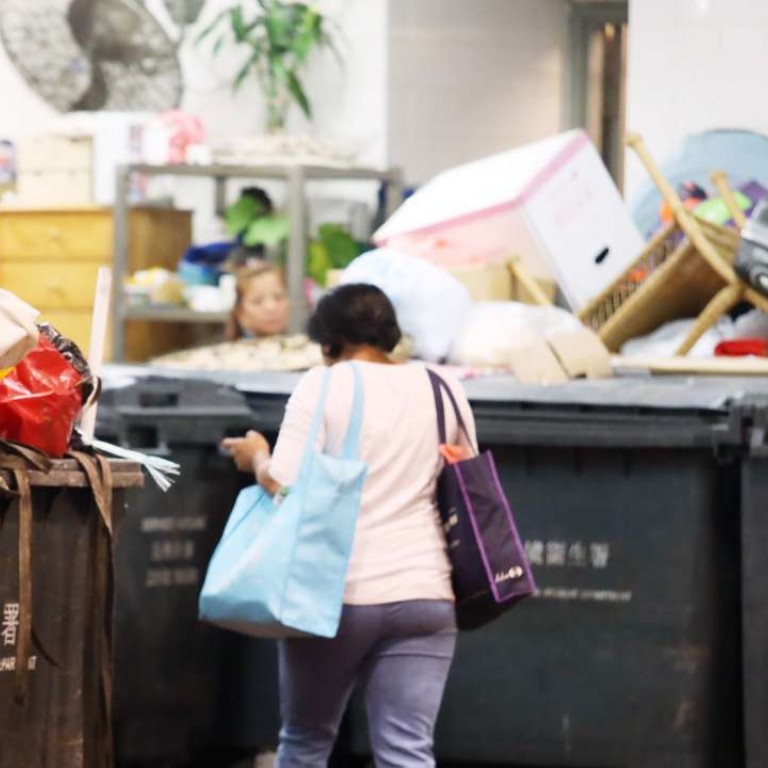
Letters to the Editor, April 25, 2017
Waste levy may not work over long term
I think there are advantages and downsides to the waste charge scheme the government intends to introduce in 2019.
In the short term, it can have the effect of reducing the volume of municipal solid waste generated in Hong Kong, as many citizens will try to cut back on household waste so that they are charged less. However, over a longer period, they will get more used to the charge and the volume will start going up again.
The problem is that so many Hongkongers have got into the habit of throwing out a lot of rubbish every day.
If attitudes could change, the scheme would be more successful, similar to the successful waste reduction initiatives in South Korea and Taiwan. The authorities there have been able to change citizens’ habits and successfully reduced waste volumes. Change is certainly needed here as our landfills are nearing capacity.
In the long term, I think the key is education, so that people change their wasteful habits. The government could think of implementing comprehensive campaigns through schools and social media.
Its adverts on TV have already had a positive response from the public, with more people using recycling bins, but these education drives will have to be expanded.
Macy Chong, Kowloon Tong
Bike rental scheme offers healthy option
Now they will be able to rent a bike and this will be a lot cheaper than purchasing one. They will just need to pay HK$5 per half hour and a deposit of HK$399.
The bikes will be very useful for certain routes where you face a long walk and would usually get the bus.
For example, it is a long way from Tuen Mun to Tuen Mun Town Plaza, about a 20-minute walk.
However, if I decide to catch a bus, with a travel time of around 10 minutes, I have to wait for up to 10 minutes at the stop so it takes me just as long.
If I can hire one of these bicycles I can cycle there and it will only cost me HK$5 for the ride. So it can improve the lives of citizens like me living in that part of Hong Kong. It is fast and convenient.
Also, the project promotes a healthy lifestyle, as you are getting a lot of exercise when you cycle. Many people do not get nearly enough exercise and this can add to their levels of stress, especially if they have to work long hours sitting at a desk in their office.
If their workplace is not far from their home, they can use this bike-for-hire service and so get regular exercise. It will increase in popularity as citizens see more individuals using the distinctive green bikes.
I hope that this bicycle-hire scheme will grow in popularity so that more citizens can benefit from it and therefore enjoy healthier lives.
Woo Cheuk-yi, Yau Yat Chuen
Shanghai can help HK pupils with maths
This is proof that the standard of maths teaching on the mainland is very high in contrast to Hong Kong. Students in our city do badly in mathematics, according to the Programme for International Student Assessment (Pisa).
In the future, Hong Kong will need more people who are gifted in maths, but compared to the mainland, so many of our students are failing in this important subject.
We need to improve our standards in science and maths or we will not have enough talented professionals to boost Hong Kong’s innovation and technology sector.
Our students’ maths and science skills must improve if Hong Kong is to remain competitive against other economies in the region. We could observe what is being done in Shanghai schools as a model to follow.
The government can organise more exchange programmes so that mainland maths teachers can come here. This will hopefully raise the standard of maths teaching in Hong Kong.
Winnie Hon Wing-lam, Tsuen Wan
Sad divisions unresolved in both nations
One of the tragic consequences of the division of Korea into North and South has been that many family members have been separated since the Korean war, with little prospect of being reunited while relations between Seoul and Pyongyang remain so strained.
Both countries have strengthened their armed forces, and there is the continued threat of conflict breaking out in the Korean peninsula.
In the past few months relations have got worse, with heightened tensions. If the two sides cannot agree to come to the negotiating table, we could see renewed hostilities and this can only lead to misery for Korean citizens on both sides of the border.
I hope the situation will improve and meetings between divided families can resume. Eventually we must all hope that there will eventually be reunification and one Korea.
Chong Wing-lam, Tseung Kwan O

